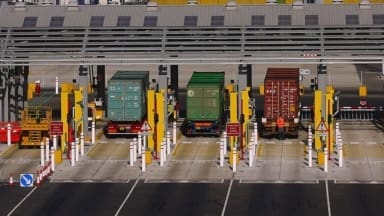
Dutch financial newspaper Het Financieele Dagblad (FD) reports that Dutch trade association for Transport and Logistics (TLN) is calling for ‘immediate action’ from the British government to tackle ongoing problems at the border.
According to the article, although no more than 5% of shipments are controlled, drivers and exporters are increasingly frustrated by the long waiting times, poor facilities and damage to transit goods. The TLN trade association, which represents 5,000 transport companies, indicated that lorry drivers may start rejecting jobs to transport goods to the UK, unless delays are reduced and driver conditions improved. A concerning development, as there is already a critical shortage of drivers.
“Our concern is that soon 100% of the shipments will have to be checked,’ explained Elmer de Bruin of TLN in the article. “How is that supposed to be later? We want to talk to the authorities to see if we can improve the situation together.”
The TLN shared a detailed report about the experiences of the drivers at the control points, which they shared with the Guardian. The report consists of a series of severe shortcomings Dutch lorry companies and drivers have experienced since the new border checks for plant and animal products was brought in on the 30th of April.
The FD article revealed that the average inspection takes four hours, but the drivers say that “depending on the staffing of a border control post, that can quietly amount to ten or even twenty hours”. Drivers are expected to hand in their car keys at border control checks and are then subject to the mercy of poor waiting rooms/facilities with just water as a provision. “Many have not become a driver to have to wait for hours in ports under minimal conditions”, said the TLN. “We are increasingly getting messages from carriers that their drivers no longer want to drive in the UK unless conditions improve.” The FD approached a UK government official for comment, whom predictably said that in the run-up to the elections, they are unable to provide a response.
The TLN also raised the problem of lack of expertise and experience amongst inspectors, whom are hence unable to replace goods safely and professionally back into the lorries causing extensive damage. Handling plant material requires expertise, the lack thereof has been of constant concern by the horticulture industry – especially so when it concerns perishable items such as cut flowers, or large tree/topiary forms. Costs incurred by the damage are difficult to recover, especially as there is reportedly no official complaints procedure.
Additional complaints in the TLN report include; the opening hours of commercial checkpoints often do not match ferry timetable, the variation in the costs of the checks at the various border control points and lack of standardised invoicing.

